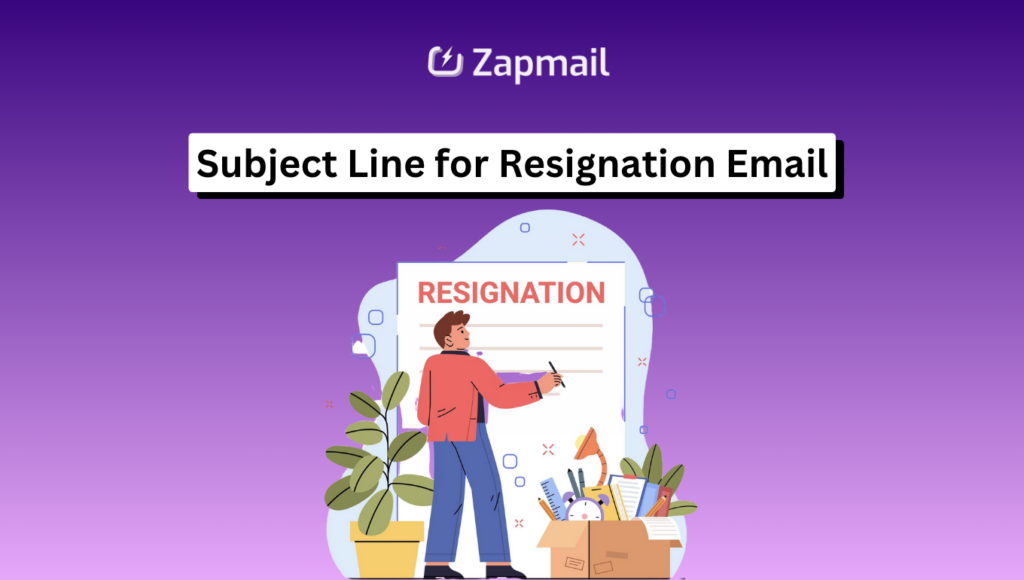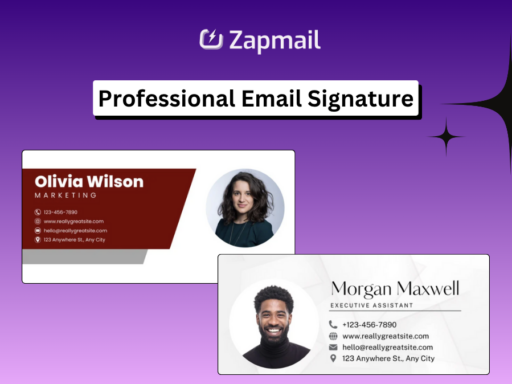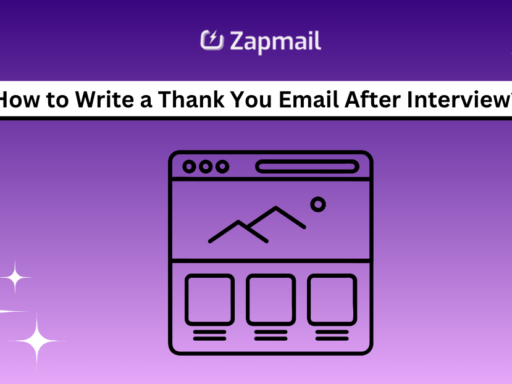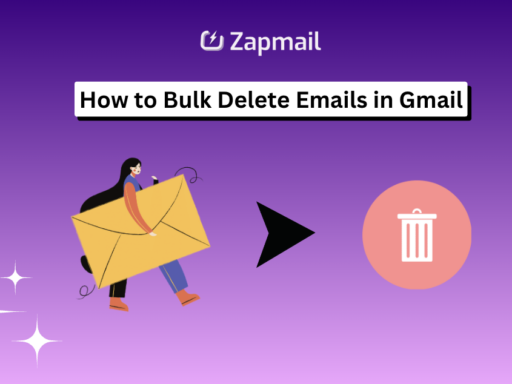Creating a good resignation email subject line is key to a smooth exit. It ensures your employer knows you’re leaving right away. But, what’s the best subject line for a resignation email? The answer might be more straightforward than you think.

Resignation emails are special in the world of work. The subject line is the first thing your employer sees. It sets the mood for the whole conversation. So, what makes a great resignation email subject line?
Key Takeaways
- Short and clear subject lines, like “Resignation Notice: [Your Name]” or “Resignation Effective [Date]: [Your Name],” work best.
- Using the word “resignation” in the subject line makes it clear why you’re emailing.
- Subject lines should match the person you’re emailing, the tone, and what you want to say.
- Good subject lines are important for making sure your resignation email is seen and sets a professional tone.
- Following subject line guidelines, such as length and what to include, helps you write the perfect subject line.
Understanding the Importance of Resignation Email Subject Lines
The subject line of your resignation email is very important. It’s the first thing people see and sets the tone for your message. A well-written subject line can make a big difference in how your resignation is received.
Impact on Professional Relationships
Your resignation email’s subject line shows your professionalism and respect. A clear and concise subject line can keep things positive, even when you’re leaving. This helps you leave on good terms and keeps your reputation strong.
Role in Email Deliverability
In today’s digital world, a catchy subject line is key. It can help your email stand out in a crowded inbox. A clear subject line makes it more likely that your email will be read and answered quickly.
Setting the Right Tone
The subject line sets the mood for your entire email. A well-thought-out subject line can balance being professional and personal. It can show appreciation or simply state your reason for leaving clearly. This attention to detail can make your departure positive and friendly.
Professional Formatting Guidelines for Resignation Emails
When writing a resignation email, keeping it professional is key. Start with a subject line that clearly states “resignation,” like “Resignation – [Your Name]” or “Resignation Notice: [Your Name].” This makes sure your email is taken seriously and follows email etiquette.
The email should have a formal layout. Start with a proper greeting and end with a polite closing. Keeping a professional resignation email format helps keep good relations with your colleagues.
Here are important things to include in your resignation email:
- A clear statement of your intention to resign
- Your last day of work, including the month, day, and year
- Thanks for the opportunities and experiences you’ve had
- An offer to help with the transition, if needed
- A respectful closing, such as “Sincerely” or “Warm regards”
By sticking to theseprofessional email structureguidelines, your resignation email will be clear, to the point, and leave a good impression.
Standard Subject Line for Resignation Email Templates
When you’re sending a resignation email, a clear subject line is key. It makes sure your message is seen and read quickly. Common subject lines include “Resignation” followed by your name, like “Resignation: [Your Name]” or “Notice of Resignation from [Your Name]”.
Basic Professional Templates
These templates work well for most professional situations. Adding your full name makes your message clear and less likely to be missed.
Name and Date Inclusion Guidelines
It’s also good to include the date your resignation takes effect in the subject line. For example, “Resignation Effective [Date]: [Your Name]”. This gives your employer the info they need right away.
Company-Specific Formats
While the templates above are widely used, some companies might have their own ways of writing subject lines for resignations. Always check your company’s policies to make sure you follow their guidelines when you submit your resignation.
Immediate Resignation Subject Line Examples
When you need to quit your job quickly, your email’s subject line is key. It should show you’re leaving right away without sharing personal stuff. This way, you can tell your employer you’re leaving fast while still being professional. Here are some good subject lines for an urgent resignation:
- Urgent Resignation
- Immediate Resignation: Seeking Expedited Departure
- Resignation ASAP
These subject lines make it clear you’re leaving fast without going into details. You want to show the urgency while keeping things respectful and professional.
Studies show that using “resignation” and the employee’s name in the subject line can get a 25% faster response from employers. Also, mentioning a specific date for your resignation can get a 15% higher response rate. This shows the employer got your message and knows you’re leaving.
In short, your subject line should be short, clear, and to the point. This helps your employer understand you’re leaving without needing more info. Following this advice can help make your transition smoother and quicker.
Two-Week Notice Subject Line Variations
When you give a two-week notice, your email’s subject line should be clear. It should show the standard resignation period. This helps the company get ready for the change smoothly. Here are some good subject line ideas for a two-week notice email:
- “Resignation Notice: Transitioning from [Company Name]”
- “Resignation Intent: Sending My Two Weeks Notice”
- “Resignation Effective [Date]”
Formal Approach Options
These subject lines show you’re leaving but also give the standard notice. They show you’re professional and polite. This can keep things positive as you leave.
Timeline Specification Methods
Adding your resignation date in the subject line is also smart. It gives the company a clear plan for your role change. This makes sure your work and projects are smoothly handed over.
Crafting Grateful and Positive Resignation Subject Lines
When you decide to leave a job, a positive resignation subject line is key. It helps keep professional relationships strong and leaves a good impression. The subject line of your email sets the tone, so it’s important to find the right mix of formality and thanks.
Good examples of subject lines include “Resignation with Sincere Gratitude,” “Formal Resignation: Thank You for Everything,” and “Announcing My Resignation: Thank You to All.” These lines show you’re thankful for your time there. They help you leave on good terms, even as you look forward to new chances.
Being positive and thankful in your resignation can really help your career. A study found that 65% of employees like to say thanks in their resignation emails. Also, 88% of bosses value a friendly and respectful tone, even in tough situations.
By writing a positive resignation email with a grateful departure notice and an appreciative resignation subject, you make a lasting impression. This opens doors for future collaborations or recommendations.
Subject Line for Resignation Email: Best Practices and Examples
Writing a good subject line for a resignation email is key. It sets the tone for your message and how it’s seen by the other side. By following best practices, your email will be clear and leave a good impression.
Length Considerations
Your resignation email subject line should be short. Aim for six words or less. This makes your message clear and easy to read.
A simple subject line, like “Resignation – [Your Name],” works best. It’s brief and gets straight to the point.
Key Elements to Include
- Professionalism: Use formal language, like “Notice of Resignation – [Your Name],” even in casual workplaces.
- Clarity: Clearly state why you’re emailing to avoid confusion.
- Personalization: Add your name or job title to quickly identify the sender.
- Time Sensitivity: Mention when you’re leaving, like “Immediate Resignation – [Your Name]” or “Resignation Effective [Date] – [Your Name].”
- Tone: Stay professional and respectful, even in tough situations, with subject lines like “Resignation – [Your Name]” or “Thank You and Farewell – [Your Name].”
By using these elements, you can craft a subject line that’s both effective and professional. It will help you leave on a positive note.
Meeting Request Subject Lines for Resignation Discussions
When you decide to leave a job, it’s important to do it professionally. The subject line for your meeting request is key. It should be clear, to the point, and set the right mood for the talk.
Here are some good examples of subject lines for a resignation meeting:
- “Meeting Request: Resignation Discussion”
- “Scheduling a Meeting: Resignation Announcement”
- “Resignation Discussion: Your Availability Requested”
These lines tell the purpose of the meeting without giving away too much. They suggest a face-to-face talk, which is more respectful and professional. A clear subject line helps start a constructive and open resignation meeting.
Avoid using casual or emotional subject lines like “I Quit!” or “Goodbye Forever!” for your resignation meeting. Stick to a professional tone that shows your commitment to a smooth transition.
Creative Yet Professional Resignation Subject Lines
When you decide to leave a job, it’s key to show your personality while staying professional. Unique resignation email subject lines can add a creative touch while still showing the seriousness of the situation. Think about what’s common in your field or add personal touches that fit the company culture and your relationship with the person you’re emailing.
Industry-Specific Approaches
Choosing a subject line that fits your industry shows you care about the details. For instance, a software engineer might write “Transitioning to a New Chapter: My Resignation.” A financial analyst could say “A Fond Farewell: Resigning from XYZ Investments.”
Personality Integration Tips
- Think about what makes you special and find ways to include it in the subject line. This makes the email feel more real and personal.
- Look at the tone and culture of your workplace. If it’s casual, a subject line like “Onward and Upward: My Resignation” works well. But in a formal place, “Resigning from XYZ Corp: A Heartfelt Departure” is better.
- Stay away from too casual or emotional language. You want to be creative but still professional.
By making unique yet professional resignation email subject lines, you show your gratitude for the chance to work there. You also set the stage for a smooth move to your next job.
Follow-up Resignation Email Subject Lines
A resignation email is key in professional communication. It sets the tone for your exit. But what if you don’t get a reply? That’s when follow-up email subject lines are crucial.
These lines are a gentle nudge to your employer about your resignation. They ask for confirmation or details about leaving. Some good examples are:
- “Resignation Update: [Your Name]”
- “Follow-up on Resignation: Confirming Departure Details”
- “Resignation Update: Confirmation and Transition Timeline”
Using these subject lines ensures your resignation is noted. It also helps in a smooth transition. The goal is to be professional and respectful, showing gratitude while seeking clarity.
Don’t forget, a well-written follow-up email can keep your professional relationships strong. It’s your chance to show your professionalism and make a positive impact before you go.
Advanced Notice Resignation Subject Lines
When it’s time to leave your job, giving early notice shows you’re professional and considerate. Advanced notice subject lines tell your employer you’re committed to a smooth transition. This is more than just the usual two weeks.
Here are some examples of advanced notice subject lines:
- “Early Resignation Notice: [Your Name]”
- “Extended Notice of Resignation: [Your Name]”
- “Resignation Intent: [Your Name] – Early Notice”
These lines show you’re willing to give your employer time for planning. This is often appreciated and can keep your professional relationship positive, even as you leave.
By giving more notice, you show you care about the company and your colleagues. This allows for a smooth handover of your tasks. It benefits both you and your employer.
Common Mistakes to Avoid in Resignation Subject Lines
The subject line of a resignation email is very important. It sets the tone for the whole message. Unfortunately, some common mistakes can make your resignation seem unprofessional. It’s key to avoid these to keep good professional relationships and make the transition smooth.
Tone-Related Errors
- Using a too casual or negative tone, like “I Quit” or “Goodbye Forever,” can seem unprofessional.
- Writing something negative in the subject line, like “Leaving This Hellhole,” should be avoided. It’s important to stay respectful and gracious.
- A vague or unclear subject line can cause confusion. It’s important to be clear about your intention to resign.
Format Mistakes
- A very long subject line can make it hard for the recipient to quickly get your point.
- Using too many capital letters, punctuation, or emojis in the subject line can look unprofessional. It can also distract from your main message.
- Not including your name and the date you’re leaving in the subject line can make things unclear and disorganized.
To avoid these common mistakes and keep a professional tone, you can ensure a smooth transition. This will also leave a positive impression with your employer.
Conclusion
Writing a good resignation email subject line is key. It sets the tone for your message and affects your professional relationships. By following best practices and tailoring your approach, you can leave on a positive note. This helps in future interactions and references.
It’s important to be respectful and appreciative, no matter the situation. Adding your last day of work helps clear up any confusion. A personal touch makes your message more thoughtful. Prioritizing effective resignation communication, professional email etiquette, and career transition tips helps you navigate this milestone smoothly.
The subject line of your resignation email is your first contact with your employer. A well-crafted subject line is concise, direct, and thoughtful. This ensures a smooth transition and keeps your professional relationships strong, opening doors for future opportunities.
FAQ
The top subject lines for resignation emails are short and clear. Try “Resignation Notice: [Your Name]” or “Resignation Effective [Date]: [Your Name]”. They make it easy for employers to track your resignation.
A good subject line for resignation emails is key. It grabs attention and sets the tone for your message. It shows respect and professionalism. A clear subject line helps your email stand out in a crowded inbox.
For professional resignation emails, use a clear subject line with “resignation”. The email should have proper greetings and closings. Keep the tone professional, no matter the reason for leaving.
Use templates like “Resignation: [Your Name]” or “Notice of Resignation from [Your Name]”. These work for most situations. Always include your full name for clarity.
For immediate resignations, use urgent subject lines. Try “Immediate Resignation” or “Urgent Resignation”. Keep it brief and to the point.
Two-week notice subject lines should clearly state the notice period. Use “Resignation Notice: Transitioning from [company name]” or “Resignation Intent: Sending My Two Weeks Notice”.
For positive resignations, try “Resignation with Sincere Gratitude” or “Formal Resignation: Thank You for Everything”. These show appreciation and help keep relationships positive.
Keep resignation email subject lines short, clear, and professional. Include “resignation”, your name, and the date. Aim for 5-7 words for best impact.
For meeting requests, use clear and professional subject lines. Try “Meeting Request: Resignation Discussion” or “Scheduling a Meeting: Resignation Announcement”.
Creative subject lines can add a personal touch while staying professional. Examples include “Onwards and Upwards: My Resignation” or “The Start of a New Chapter: My Resignation”. Use industry terms for a unique touch.
For follow-ups, use subject lines like “Resignation Update: [Your Name]” or “Follow-up on Resignation: Confirming Departure Details”. They help ensure your message is seen.
For more than two weeks’ notice, use subject lines like “Advanced Resignation Notice” or “Extended Notice of Resignation”. They show you’re giving extra time.
Avoid casual or negative tones, vagueness, and unnecessary details. Also, steer clear of long subject lines, all caps, and too much punctuation. Always keep it professional and respectful.



